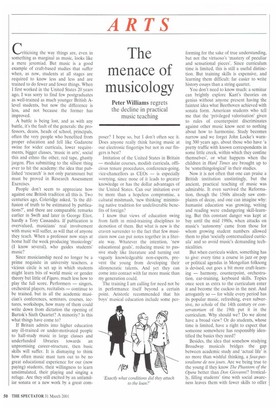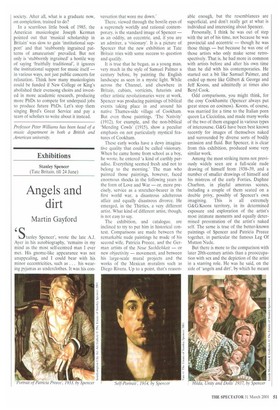The menace of musicolo
Peter Williams regrets the decline in practical music teaching Criticising the way things are, even in something as marginal as music, looks like a mere jeremiad. But music is a good example of craft-based studies that suffer when, as now, students at all stages are required to know less and less and are trained to do fewer and fewer things. When I first worked in the United States 20 years ago, I was sorry to find few postgraduates as well-trained as much younger British Alevel students, but now the difference is less, and not because the former has improved.
A battle is being lost, and as with any battle, it's the fault of the generals: the professors, deans, heads of school, principals, often the very people who benefited from proper education and fell like Gadarene swine for wider curricula, lower requirements, bigger classes, 'music in arts', social this and ethno the other, red tape, ghastly jargon. Plus submitting to the silliest thing ever to hit the academy: the idea that published 'research' is not only paramount but must be proved in Research Assessment Exercises.
People don't seem to appreciate how against one British tradition all this is. Two centuries ago, Coleridge asked, 'Is the diffusion of truth to be estimated by publications?', and there are comparable remarks earlier in Swift and later in George Eliot, hardly a Tory Cassandra. If publication is overvalued, musicians' real involvement with music will suffer, as will that of anyone they teach. When a professor now stays at home half the week producing 'musicology' (I know several), who guides students' music?
Since musicianship need no longer be a prime requisite in university teachers, a vicious circle is set up in which students might learn bits of world music or -gender theory but little of Figaro, much less how to play the full score. Performers — singers, orchestral players, recitalists — continue to be trained, but in all the academic musician's conferences, seminars, courses, lectures, workshops, how many of them could write down from dictation the opening of Bartok's Sixth Quartet? A minority? Is this what things have come to?
If Britain admits into higher education any ill-trained or under-motivated people to half-study music in large classes and underfunded libraries towards an unpromising career-structure, then basic skills will suffer. It is dismaying to think how often. music must turn out to be no great educational experience for our (now paying) students, their willingness to learn unstimulated, their playing and singing a refuge. Are they still excited by an unfamiliar sonata or a new work by a great corn
poser? I hope so, but I don't often see it. Does anyone really think having music at our electronic fingertips but not in our fingers is best?
Imitation of the United States in Britain — modular courses, modish curricula, officious tenure procedures, conference-going, vice-chancellors as CEOs — is especially worrying, since none of it leads to greater knowledge or has the dollar advantages of the United States. Can our imitation ever be more than a hopeless compromise, a cultural mishmash, 'new thinking' minimising native tradition for undeliverable benefits of foreign?
I know that views of education swing from faith in mind-training disciplines to demotion of them. But what is new is the craven surrender to the fact that few musicians now can put notes together in a literate way. Whatever the intention, 'new educational goals', reducing music to passive study like literature and turning out vaguely knowledgeable non-experts, prevent the young from developing their idiosyncratic talents. And yet they can come into contact with far more music than my generation could.
The training I am calling for need not be in performance itself beyond a certain point. Aristotle recommended that his boys' musical education include some per forming for the sake of true understanding, but not the virtuoso's 'mastery of peculiar and sensational pieces'. Since curriculum time is limited, this is still a useful distinction. But training skills is expensive, and learning them difficult: far easier to write history essays than a string quartet.
You don't need to know much: a seminar can brightly explore Kant's theories on genius without anyone present having the faintest idea what Beethoven achieved with sonata form. American students who tell me that the 'privileged valorisation' given to rules of counterpoint discriminates against other music know next to nothing about how to harmonise. Study becomes narrow and we forget John Locke's warning 300 years ago, about those who have 'a pretty traffic with known correspondents in some little creek, within which they confine themselves', or what happens when the children in Hard Times are brought up to be `somethingological' in their studies.
Now it is not often that one can praise a British institution unstintingly, but the ancient, practical teaching of music was admirable. It even survived the Reformation, though the 1560s already saw complaints of decay, and one can imagine why: humanist education was growing, writing and reading were endangering skill-learning. But this constant danger was kept at bay until the mid 1980s, when attacks on music's 'autonomy' came from those for whom growing student numbers allowed them to plan 'socially contextualized curricula' and so avoid music's demanding technicalities.
But when curricula widen, something has to give: every time a course in jazz or pop or political agendas in Mongolian folksong is devised, out goes a bit more craft-learning — harmony, counterpoint, orchestration, ear-training, keyboard skills. Topics once seen as extra to the curriculum enter it and become the cuckoo in the nest. And arrogantly so — for while every period has its popular music, refreshing, even subversive, no schola of the 14th century or conservatorium of the 19th put it in the curriculum. Why should we? Do we alone have a broad view? Or do students, whose time is limited, have a right to expect that someone somewhere has responsibly identified the basics they need?
Besides, the idea that somehow studying Broadway musicals bridges the gap between academic study and 'actual life' is no more than wishful thinking, a faux-pastoralisme de nos fours. Are we being true to the young if they know The Phantom of the Opera better than Don Giovanni? Ironically, filling students' time with social awareness leaves them with fewer skills to offer
society. After all, what is a graduate now, on completion, trained to do?
In a scurrilous little book of 1985, the American musicologist Joseph Kerman pointed out that 'musical scholarship in Britain' was slow to gain 'institutional support' and that 'stubbornly ingrained patterns of amateurism' prevailed. But not only is 'stubbornly ingrained' a hostile way of saying 'fruitfully traditional', it ignores the institutional support for music itself — in various ways, not just public concerts for relaxation. Think how many musicologists could be funded if New College or King's abolished their evensong choirs and invested in more academic research, producing more PhDs to compete for underpaid jobs to produce future PhDs, Let's stop them singing Byrd's Great Service and pay a team of scholars to write about it instead.
Professor Peter Williams has been head of a music department in both a British and American university.



























































































 Previous page
Previous page